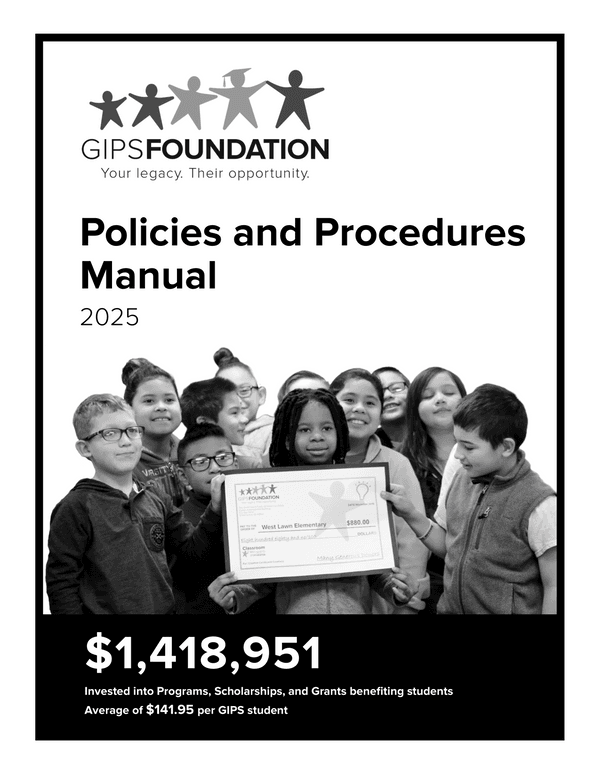Policies and Procedures
Gift Acceptance Policy
Statement of Policy
Private giving helps ensure Grand Island Public Schools Foundation’s excellence in services offered to support the on-going needs of students of the Grand Island Public Schools. Private gifts allow the Foundation to fund scholarships, programs, equipment, building and campus renovations, and new facilities. The Grand Island Public Schools Foundation office plans, coordinates, and implements fund-raising programs with parents, community members, friends, corporations, and foundations.
Mission
The Grand Island Public Schools Foundation (the Foundation) will enhance student educational opportunities through its support of the Grand Island Public Schools by seeking, securing, and managing resources for scholarships, projects and programs.
The Foundation exists to secure private gifts for the benefit of Grand Island Public School students, programs and facilities. The Foundation is an organized corporation, exempt from federal tax liability by Internal Revenue Code Section 501(c)(3), and qualifies as a Public Charity under Internal Revenue Code Section 509.
All gift acceptance policies and procedures at the Foundation shall be interpreted in light of two overriding principles:
Principle 1: A gift shall not be accepted by the Foundation if such acceptance would not be in the interest of the donor.
A determination of the donor’s “interest” shall include, but not be limited to, the donor’s financial situation and philanthropic interests, as well as any tax or other legal matters revealed while planning for a gift. The Foundation shall not encourage any gifts that are inappropriate in light of the donor’s personal or financial situation.
Principle 2: The Foundation will accept only gifts that support the Foundation’s mission.
The Foundation reserves the right to accept or deny any gift.
In certain unique cases, a gift may be considered inappropriate due to particular restrictions imposed by the donor, or the nature of the gift. By its very definition, a gift cannot be associated with a private benefit that would jeopardize the charitable contribution deduction under IRC section 170 if the donor and beneficiary of the restriction have less than an arms-length relationship.
There must be a distance between the donor and recipient such that the recipient does not receive benefits that are otherwise not available to colleagues of similar status and interest. For example, in the capacity of donor, an individual cannot subsidize his/her own salary, travel funds, or fringe benefits.
Reason for Policy
While this document is intended to provide guidance to the Foundation Office and other Foundation personnel regarding acceptance of prospective gifts, donors are ultimately responsible for ensuring that the proposed gift furthers their charitable, financial, and estate planning goals. The Foundation Office does not provide legal, accounting, tax, or other advice to prospective donors. Therefore, each prospective donor is urged to seek the advice of independent legal counsel in the gift planning process.
Who Should Know This Policy
· Foundation Board of Directors
· Foundation Staff
General Definitions
Gift - A gift is consideration given for which the donor receives no direct benefit and requires nothing in exchange beyond an assurance that the intent of the contribution will be honored. A gift may also include a “quid pro quo contribution” within the meaning of section 6115 of the Internal Revenue Code where goods or services may be provided to the donor in recognition of the consideration given by the donor. Where there is a quid pro quo contribution, the disclosure and substantiation requirements of the Internal Revenue Code will be complied with. Gifts made to the Foundation and gifts made directly to Grand Island Public Schools are both processed and reported by the Foundation Office.
Conditional Gifts - Gifts which, because of some qualifier or restriction, are considered non-routine. Conditional gifts may commit the Foundation to act within a specified time or use a gift for a specific purpose. A conditional gift may also include a bargain sale of property to the Foundation where the acquisition price paid for the property will be less than the property’s fair market value and there is a donative intent in establishing the acquisition price of the property below its fair market value.
Outright Gift - These gifts are typically gifts of cash, stocks, bonds, real property, tangible personal property, or gifts-in-kind.
Pledge - Pledges are commitments to give a specific dollar amount according to
a fixed time schedule.
Planned Gift - Planned gifts generally are gifts or commitments made in the present with the benefit to the Foundation "deferred" until a future date. Planned gifts may include outright gifts of appreciated property (securities and real estate) or gifts of tangible personal property.
Endowment - A gift of at least $12,500 (assuming x 4% = $500 annual distribution) to be invested for the purpose of producing present and future income that may be expended or reinvested with the original gift. The principal of the endowment is kept intact. Income is expended according to the donor’s stipulation and may be unrestricted or restricted.
Qualified Appraisal - Such appraisals are customarily obtained by the donor to support the allowance of specific income tax charitable deductions. Qualified appraisals are required when the claimed deduction for the donated property, other than money or publicly traded securities, is more than $5,000, or $10,000 for non-publicly traded securities. Property may be valued internally by using the fair market value as determined by qualified appraisals supplied by the donor.
Types of Gifts
Gifts to the Foundation may be in the form of outright gifts, pledges, or deferred commitments.
Outright Gifts - Cash and cash equivalents. Cash is often the easiest way to give and most frequently received form of gift accepted by the Foundation. These gifts can take the form of currency, check, or credit card contribution. Cash may be delivered in person, by mail, by Electronic Funds Transfer (EFT), or by wire transfer. Cash gifts are reported the date the cash is received in the Foundation office. If gifts are transferred by EFT or wire, the date of the gift is the date that the money is transferred into the Foundation’s bank account. Credit card gifts are reported on the date that the credit card charges are processed.
The Foundation will accept cash as a payment or donation for transacting business provided it meets the following criteria:
1. Is official currency of the United States of America
2. Is less than $1,500 in currency per donor, per 12-month period (checks or other forms of payment are not considered against this annual currency threshold).
Publicly Traded Securities - Securities (1) listed on an exchange in which quotations are published daily; (2) regularly traded in national or regional over-the-counter markets for which published quotations are available; or (3) that are shares of a mutual fund for which quotations are published on a daily basis in a newspaper of general circulation throughout the United States, will be accepted as outright gifts or toward pledges. The value of securities is determined on the recognized gift date, which is established when the donor relinquishes control of the securities. The average of the high and low trading prices on the gift date determine the value of securities for reporting purposes.
Donations made shall be liquidated at fair market value upon being entrusted into the professional money manager’s care and reinvested immediately into the Foundation’s portfolio.
Closely Held Securities (non-public) - The Foundation shall examine any issue that is not publicly traded prior to its acceptance as a gift and may decline a gift of such securities if it deems them difficult to value or not easily marketable. The Finance Committee must approve gifts of non-publicly held securities prior to acceptance.
Real Property - Real property includes improved or unimproved land, personal residences, farmland, commercial property, rental property, and mineral interests. If it is the intention of the donor that the Foundation not immediately dispose of real property, an agreement must be made in writing between the Foundation and the donor before the Foundation may accept such property. All gifted real estate must be tested to be in conformity with state and federal laws, including EPA regulations, and the donor must provide satisfactory evidence of environmental compliance.
Personal Property - The Foundation may consider gifts of personal property, including but not limited to works of art, patents, copyrights, antiques, stamp and coin collections, jewelry, furniture, rare books, manuscripts, or any other item that has a determinable value. The Finance Committee may approve such donations only after a review indicates that the property is either readily marketable or needed by the Foundation or Grand Island Public Schools. It is the policy of the Foundation to sell or otherwise dispose of all gifts of personal property, unless the items can be used by the Foundation in a manner related to, education, discovery, or engagement. The Foundation’s intention to either resell the property or to retain and use it to further its charitable activities shall be communicated to the donor in writing at the time of the gift.
Gifts-in-kind - Gifts-in-kind for which donors are eligible for a charitable gift deduction in accordance with current IRS regulations should be reported at the fair market value placed on them by an independent, expert appraiser. Only those gifts in-kind that can be converted to cash, or items such as equipment, books, artworks, etc. that can be used in support of delivery of education or support programs, should be reported. Receiving departments must agree to use the in-kind materials before accepting the gift. Depending on the appraised value of the donated item, IRS Form 8283 may be submitted to the Foundation. If the donor does not supply a value, someone in the receiving department who has knowledge of the general type of item should provide a statement of condition. Internal values of donated items are not to be shared with donors.
Pledges - Pledges are commitments to give a specific dollar amount according to a fixed time schedule. All pledges are required to be in writing.
The following minimum information must exist to substantiate a pledge:
· the amount of the pledge must be clearly specified;
· there should be a clearly defined payment schedule;
· the donor may not prescribe contingencies or conditions;
· the donor must be considered to be financially capable of making the gift;
· changes to original pledges must be documented in writing.
Pledge recording:
· Anticipated matching gifts will not be included in pledge amounts.
· Pledges and expected matching gifts will qualify for donor recognition in appropriate giving level groups.
· Under- and over-paid pledges (as a result of either rounding, gift valuation, or incremental giving) will be noted as paid in full when donors’ intents are clearly to pay commitments in full.
· Before defaulted pledges are written off, pledge deactivation requests must be reviewed and approved by the Executive Director and Board President.
Other Gifts - Gifts which do not fall into one of the foregoing categories will be evaluated on a case by case basis in accordance with this Policy.
Planned Gifts
Charitable Bequests - Donors can make charitable bequests to the Foundation in wills or living trusts.
Charitable Remainder Trust - A charitable remainder trust is established when a donor irrevocably transfers money or securities to a trustee who invests the assets to pay annual lifetime income to the donor or others chosen by the donor. At the end of the beneficiaries’ lives, the remaining trust assets are distributed to the Foundation.
Annuity trusts provide the tax advantages of current contributions with the security of fixed, lifetime incomes, generally for the donors and their spouses. The agreed-upon annual payments remain unchanged regardless of how the investments perform. The unitrust differs from the annuity trust by providing a variable income. Payment is based on a fixed percentage of the net fair market value of the trust assets as valued annually.
Charitable Lead Trust - This type of gift provides an income stream for a specified period of time to the Foundation. The Foundation receives the income from the trust and applies it to the specific project. The principal is then returned at the end of the set period to whomever the donor designates.
Gifts of Life Insurance - Gifts of life insurance may name the Foundation beneficiary of the policy or as beneficiary and owner. Said policies should be reviewed on the policy anniversary date to ensure adequate funding to sustain the policy.
Retained Life Estate - Donors can receive a sizable charitable income tax deduction by making a gift to the Foundation of their personal residence or farm, while retaining full use and rights to the property during their lifetime.
Revocable Trust - Through a written agreement, the donor transfers assets to a trustee.
Income is paid to the donor for the term of the trust.
Endowments
To assure the acceptability of endowment gifts, the Executive Director will notify the Finance Committee which has the authority to recommend approval for standard agreements.
Unique, nonstandard endowment agreements may require additional review and approvals. It is the responsibility of the Executive Director to obtain recommendations from the Finance Committee before final approval.
Procedures
Finance Committee
The Finance Committee shall consist of the following:
· GIPS Foundation Executive Director
· GIPS Foundation Board President
· GIPS Foundation Vice President
· GIPS Foundation Secretary
· GIPS Foundation Treasurer
· and other GIPS Foundation Board Members appointed by the Board President
The Finance Committee shall review all gifts of significant risk. All such gifts shall be documented by a written understanding between the donor and the Foundation, and must be approved by the Finance Committee before the GIPS Foundation may accept the gifts. Once a gift has been accepted, the Grand Island Public Schools Foundation Office is responsible for recording and acknowledging it.
Gifts of Significant Risk
· Non-publicly traded securities
· All gifts of real property
· Gifts of personal property if not to be used by GIPS or the Foundation
· All gifts of real or tangible personal property subject to donor restrictions regarding the disposal of such property
· Any bargain sale of property where a donative element is associated with the
acquisition of property by the Foundation below its fair market value
· Cash gifts with significant donor restrictions
· All gifts of unusual items or gifts of questionable value
The committee shall meet as necessary to approve specific gifts. Decisions of the committee must be made by consensus. If consensus cannot be reached, gifts will be forwarded to the Board of Directors for review and final decision.
Based upon the recommendation of the appropriate department all other gifts may be accepted by the Foundation Office.
Special Situations
Conditional Gifts - Conditional gifts are those gifts that, because of some qualifier or restriction, are considered non-routine. Conditional gifts may commit the Foundation to act within a specified time or use a gift for a specific purpose. If, in any instance, a gift offered by a donor would put the Foundation in an embarrassing or untenable position with the general public, the Foundation will decline acceptance. Time limits for holding a conditional gift may be reviewed by the Finance Committee. Gift acceptance agreements should specify a time period for meeting the conditions for the gift and should also indicate what will happen to the gift if conditions are not met. Primary choices are to move the gift to a different account or to refund the gift. The Executive Director will draft an acknowledgment of a conditional acceptance for appropriate signature. This will be sent to a donor within 10 days of approval of this form. A second acknowledgment letter will be sent when conditions have been satisfied.
Refunding of Gifts - In rare instances, the Foundation may deem it necessary to refund gifts, either because it is in the best interest of the Foundation or because conditions agreed to in accepting a gift cannot or will not be met. Requests for refunds may come either from the donor or from the recipient department and must include a statement of reason addressed to the Finance Committee.
Conditions under which gifts may be refunded:
· When conditions of acceptance cannot be met or cannot be agreed to.
· When it is in the Foundation’s interest and when continuing to hold a gift would not enhance Grand Island Public Schools reputation either with the donor or with the general public.
Recognition Discounts & Services - The Foundation recognizes that corporations or private individuals may offer significant discounts on materials or services to Grand Island Public schools. While these “gifts” do not qualify as tax-deductible donations, it is important to acknowledge and recognize these items through the Foundation’s formal stewardship programs. Donor acknowledgement of a significant discount on materials or services will be made by the Foundation and the receiving department at its discretion.


